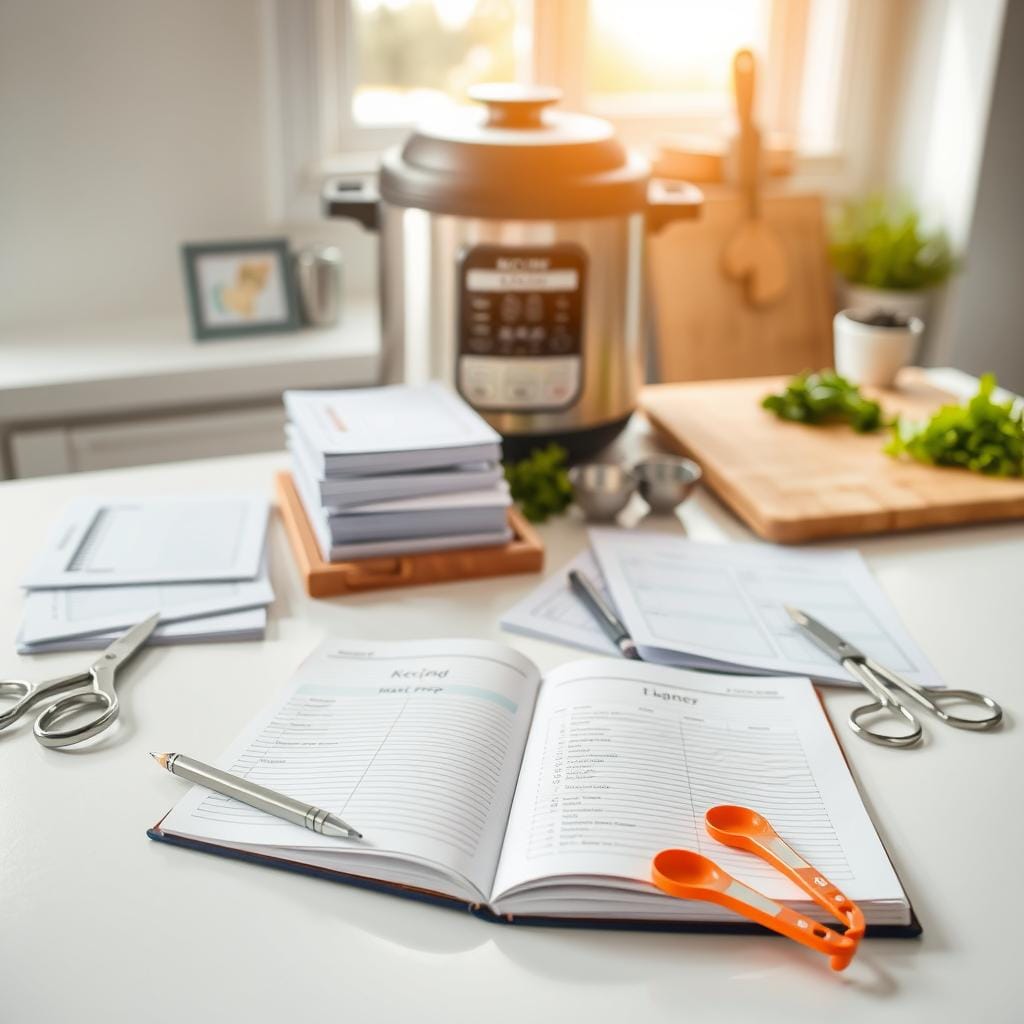Table of Contents
Are you tired of daily food stress and constant decision-making about what to eat? What if I told you there’s a way to change your eating habits? This could save you time, money, and boost your health.
Welcome to the meal planning guide that will change how you think about food. I’m passionate about making nutrition easy and efficient. Strategic weekly meal plans are more than just eating. They’re about building a healthy lifestyle that supports your goals.
The National Library of Medicine says home-cooked meals are better for you. They help you eat less, manage your weight, and get more nutrients. My guide will show you how to make healthy meals easy and stress-free.
Key Takeaways
- Reduce daily food-related stress with strategic meal planning
- Save time and money through efficient food preparation
- Improve nutritional intake by planning balanced meals
- Learn techniques to avoid impulse eating and unhealthy choices
- Create sustainable eating habits that support long-term health
Understanding Meal Planning: What It Is and Why It Matters
Meal planning changes how I think about food and cooking. It’s not just picking what to eat. It’s a way to manage my diet, time, and money well.
Meal planning means planning meals for a week ahead. It helps me make affordable meals and organize my shopping and cooking better.
Benefits of Meal Planning
Meal planning has many benefits. Here are some I’ve found:
- Reduces food waste by up to 30%
- Saves money on grocery shopping
- Decreases daily stress about meal decisions
- Improves overall nutrition
- Enables more intentional eating habits
Common Misconceptions
“Meal planning is too time-consuming” is a myth I’ve learned to dispel.
Many think meal planning takes a lot of time. In reality, it can save me 2-3 hours weekly. Most meal planning takes only 30-45 minutes, making it quick and efficient.
Meal Planning for Special Diets
Meal planning fits everyone, not just one type. I can adjust my plans for vegetarian, keto, or gluten-free diets to meet my nutritional needs.
| Diet Type | Key Considerations |
|---|---|
| Vegetarian | Protein alternatives, balanced nutrients |
| Keto | Low-carb, high-fat meal options |
| Gluten-Free | Alternative grains, careful ingredient selection |
By grasping these meal planning basics, I can tailor a system that suits my lifestyle. It saves time, money, and reduces mealtime stress.
Setting Your Meal Planning Goals
Creating a good meal plan starts with knowing what you want to achieve. Whether it’s controlling portions or planning your diet better, having clear goals is key.
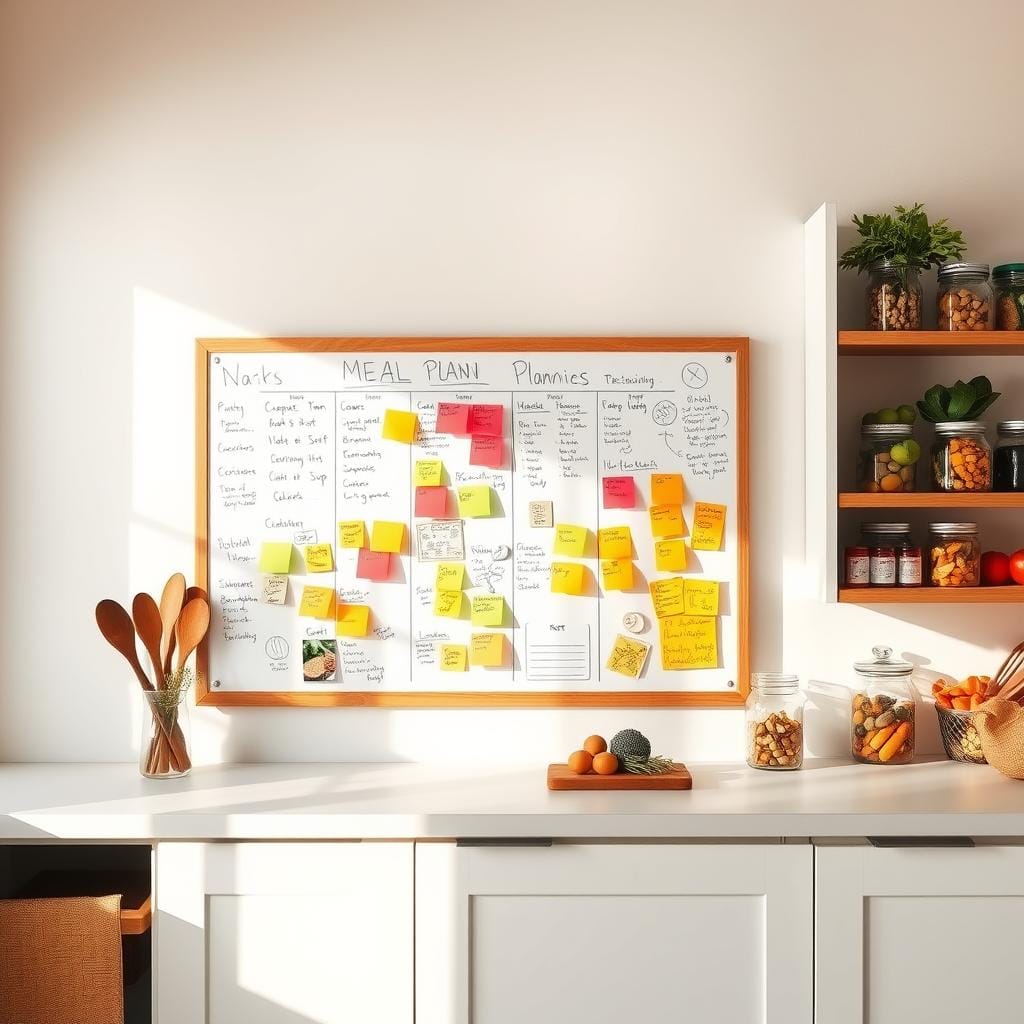
Before you start planning meals, take time to think about what you need. A good diet plan is not one size fits all. It’s about finding what works best for you.
Defining Personal Goals
Your meal planning journey starts with knowing yourself. Ask these important questions:
- What are my main health goals?
- Do I want to lose weight, gain muscle, or stay fit?
- Are there certain foods I need to avoid?
Assessing Nutritional Needs
Knowing what your body needs is vital for portion control. Your age, how active you are, and any health issues all affect what you should eat.
“Know your body, plan your meals, transform your health.”
Time Management Considerations
Adding meal planning to a busy schedule needs smart planning. Studies show 50% of Americans plan meals, saving 3 hours a week. Spending a few hours upfront can make your whole week easier.
Here’s how I suggest you start:
- Choose a regular planning day
- Make a flexible meal plan
- Get ingredients ready ahead of time
Remember, the goal of diet planning is to make progress, not to be perfect. Start small, stay consistent, and you’ll see your goals become a part of your life.
Choosing a Meal Planning Method That Works for Me
Finding the right meal planning method can change how you cook and make your daily life easier. There are many options, so picking one that fits your lifestyle is key. This ensures you can prep meals well and keep a steady meal calendar.
Exploring different meal planning strategies can make planning meals fun and simple.
Traditional vs. Digital Meal Plans
Meal planning can be done in two main ways: with paper or digital tools. Each has its own benefits:
- Traditional Paper Methods
- Use notebooks to track meals
- Love the feel of writing
- No need for batteries or internet
- Digital Meal Planning
- Easy to update and change
- Works on all your devices
- Has great recipe and shopping list tools
Using Apps or Software
Digital tools can make meal planning much easier. Studies show 52% of people use meal prep apps. These apps save a lot of time.
| App Feature | Time Savings |
|---|---|
| Grocery List Creation | 50% faster |
| Recipe Management | 20 minutes saved per meal |
| Meal Calendar Tracking | Instant updates |
Paper vs. Digital Shopping Lists
Whether to use paper or digital shopping lists is up to you. Digital lists update in real-time, but paper lists offer a hands-on experience.
Pro tip: Try both to see which suits your meal planning best!
The main goal is to make meal planning less stressful, save time, and eat better. With 60% of people eating healthier with meal prep, finding your perfect method is worth it.
Creating a Weekly Meal Plan: Step-by-Step
Making a weekly meal plan can be easy. I’ll show you how to make meal prep fun and stress-free. My aim is to help you save time, reduce stress, and meet your nutrition goals with a meal calendar.
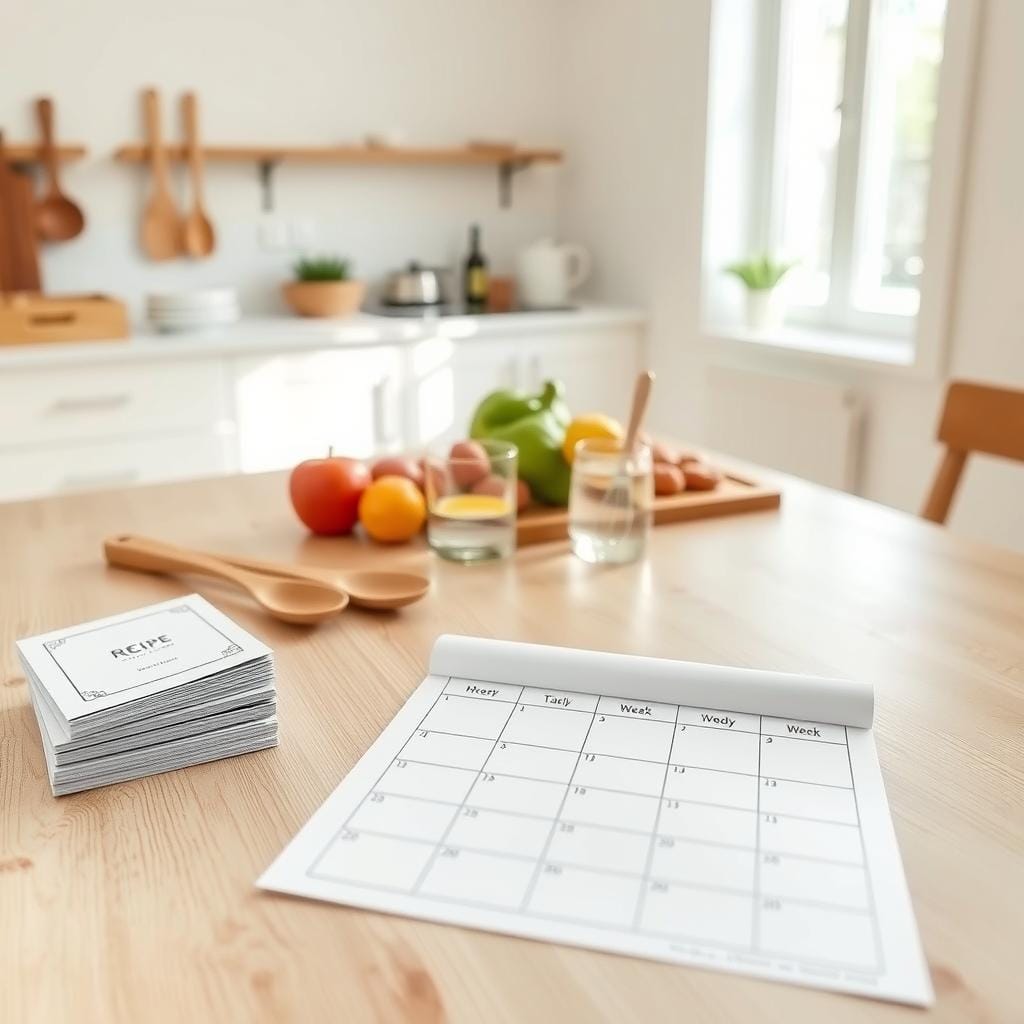
Now, let’s explore the main steps for creating a meal plan that fits your life:
- Select a Consistent Planning Day
- Find a day with 30-60 minutes of free time
- Sunday is often the best choice for many
- Match your planning with grocery sales to save money
- Map Out Your Meal Calendar
- Use a grid for each day of the week
- Plan meals for breakfast, lunch, dinner, and snacks
- Try theme nights like Meatless Monday or Taco Tuesday
Strategic Meal Organization
Studies show that 60% of meal planners save 2-3 hours a week. By planning meals, you avoid last-minute stress and save time.
“Meal planning is not about perfection, but about making intentional choices that support your health and lifestyle.”
Balancing Meals Across the Day
Make sure your meal plan is balanced for nutrition. Research shows that 70% of people eat better with a plan. Include meals with:
- Balanced nutrients
- Different veggies and proteins
- Flexible options for when plans change
By following these tips, you’ll make meal planning easy and efficient. It will help you reach your diet goals and lower daily stress.
Balancing Nutritional Needs in My Meal Plan
Creating a balanced meal plan is essential for good health. It lets me choose the right nutrients for my body. Understanding macronutrients and controlling portions helps me plan meals that boost my well-being.
Understanding Macronutrients for Optimal Nutrition
I focus on the 40-30-30 macro ratio in my meal planning. This means:
- 40% Carbohydrates: Giving me energy and important nutrients
- 30% Proteins: Helping my muscles grow and stay strong
- 30% Healthy Fats: Boosting my metabolism
Fruits and Vegetables: Nutritional Powerhouses
Adding a variety of fruits and vegetables to my diet is key. The U.S. dietary guide suggests filling half my plate with them.
| Produce Category | Nutritional Benefits | Recommended Servings |
|---|---|---|
| Leafy Greens | High in vitamins A, C, K | 2-3 servings daily |
| Colorful Vegetables | Rich in antioxidants | 3-4 servings daily |
| Seasonal Fruits | Natural sugars, fiber | 2 servings daily |
Mastering Portion Control
Controlling portions helps me keep my calorie intake in check. I use several strategies:
- Using smaller plates to naturally reduce serving sizes
- Measuring ingredients precisely
- Listening to my body’s hunger signals
“Eating mindfully is not about restriction, but about nourishing your body with the right amounts of nutrients.”
By using these diet planning methods, I can make meals that are both tasty and healthy. Portion control is about making smart food choices, not feeling limited.
Smart Grocery Shopping Strategies
Shopping at the grocery store can be tough, but it’s easier with the right tips. I’ll share how to save money and find great deals for affordable meals.

Creating an Effective Grocery List
A good grocery list is key to smart shopping. It should match your meal plan and budget. Here are some tips:
- Check your pantry before shopping to avoid duplicate purchases
- Organize your list by store sections to save time
- Prioritize essential ingredients for your planned meals
How to Avoid Impulse Buys
Impulse buys can blow your budget. About 60% of grocery store purchases are unplanned. Here’s how to avoid them:
- Never shop when hungry – 45% of shoppers make impulsive purchases on an empty stomach
- Stick strictly to your prepared list
- Use cash or a predetermined budget to limit overspending
Shopping Seasonal: Maximizing Freshness
Shopping for seasonal produce is a smart move. It saves money and gives you fresher ingredients.
| Season | Cost-Effective Produce | Potential Savings |
|---|---|---|
| Spring | Asparagus, Artichokes | Up to 30% cheaper |
| Summer | Berries, Tomatoes | Up to 40% cheaper |
| Fall | Squash, Apples | Up to 35% cheaper |
| Winter | Citrus, Kale | Up to 25% cheaper |
“Smart shopping isn’t about spending less, it’s about spending wisely.” – Grocery Shopping Expert
By using these tips, you’ll change how you shop for groceries. You’ll save money and enjoy healthier, affordable meals.
Preparing Ingredients Ahead of Time
Meal prep is a big help for busy cooks. It makes cooking easier and less stressful. Just a little time spent on prep can change your week.
Meal prep can save you 4-5 hours a week. This is compared to cooking every day. Let’s look at the best ways to prep ingredients ahead.
Best Practices for Meal Prep
Good meal prep starts with planning. Here are some tips to make prep time count:
- Choose a consistent prep day (usually Sunday)
- Invest 1-2 hours for thorough ingredient prep
- Focus on versatile ingredients for many recipes
- Use airtight containers for storage
Proper Food Storage Techniques
Keeping ingredients fresh is key. Here’s how to keep them good:
| Ingredient Type | Storage Method | Estimated Freshness |
|---|---|---|
| Chopped Vegetables | Sealed container with paper towel | 3-5 days |
| Cooked Proteins | Airtight container in refrigerator | 4-5 days |
| Grains | Sealed container in cool, dry place | 5-7 days |
Batch Cooking vs. Daily Prep
Batch cooking and daily prep have their own benefits. Batch cooking can save up to 70% of cooking time. Daily prep lets you have fresher meals.
“Meal prep is not about perfection, but about making cooking more manageable and enjoyable.”
Using these meal prep tips can make your life easier. You’ll save time, reduce stress, and eat healthier homemade meals all week.
Incorporating Variety in My Meal Plans
Keeping meal plans exciting is key to diet success. Eating the same meals over and over can get boring. I aim to make meal times fun and nutritious.
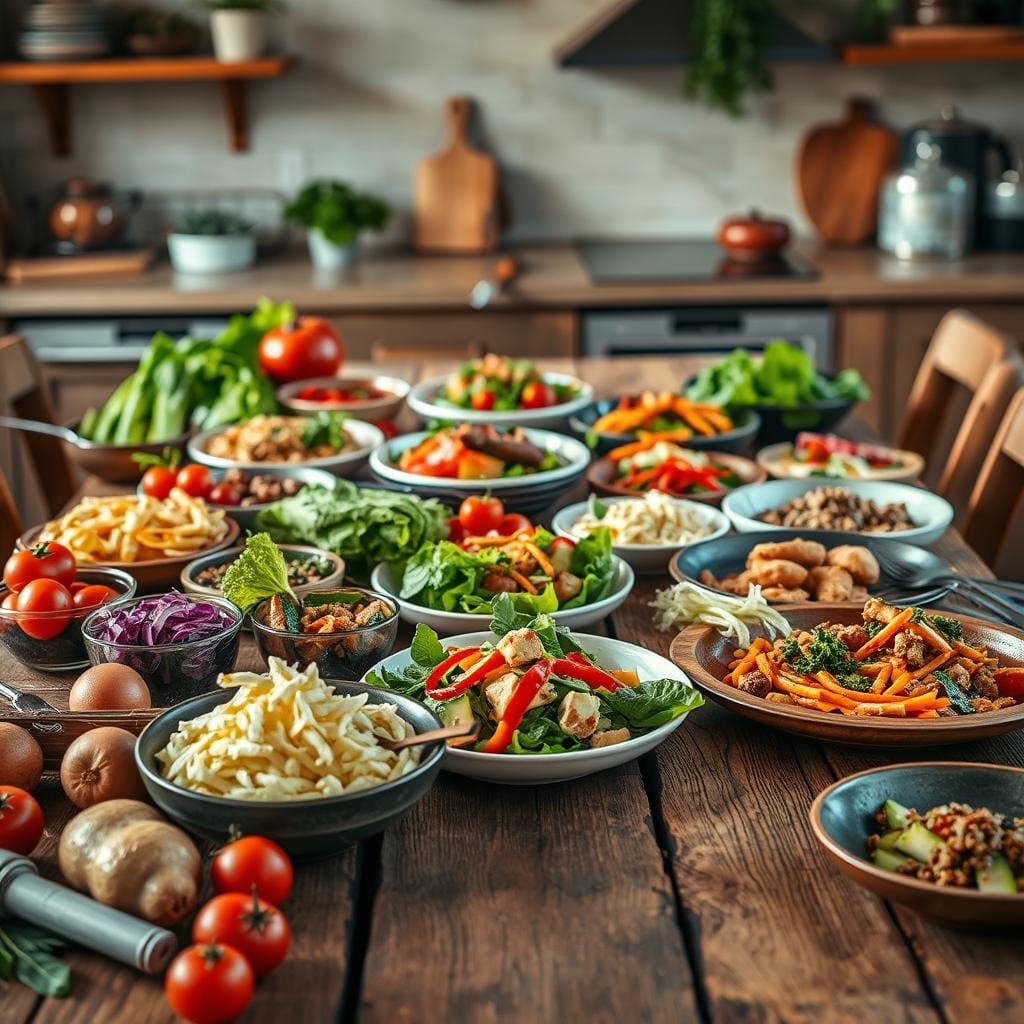
Rotating Recipes to Avoid Monotony
Variety is essential in diet planning. I suggest a recipe rotation to mix up meals. This keeps things interesting and prevents boredom.
- Create a monthly recipe calendar
- Designate themed cooking nights (e.g., Mexican Monday, Stir-Fry Wednesday)
- Challenge yourself to try one new recipe each week
Exploring New Cuisines and Flavors
Trying new cuisines can make meal plans exciting. International cuisine offers endless inspiration for diverse and tasty meals.
| Cuisine | Signature Ingredient | Nutritional Benefit |
|---|---|---|
| Mediterranean | Olive Oil | Heart-healthy fats |
| Japanese | Seaweed | Rich in minerals |
| Indian | Turmeric | Anti-inflammatory properties |
Getting Creative with Leftovers
Turning leftovers into new meals is fun and saves food. I love making chicken tacos or salad from last night’s roast chicken.
Creativity in the kitchen turns leftovers from boring repeats into exciting new meals!
With these tips, my meal plans stay fresh and fun. Meal planning can be a joyful journey, not a chore!
Cooking Efficiently: Time-Saving Tips
Learning to prep meals and cook in batches can change how you use your kitchen. It makes cooking faster and more efficient. You’ll save time and always have healthy meals ready.
Efficient cooking is not just about being quick. It’s about being smart. I’ve found ways to cook faster without losing flavor or quality.
One-Pot Meals and Sheet Pan Dinners
These methods are great for those with little time. One-pot meals and sheet pan dinners are perfect because they:
- Require less cleanup
- Save time cooking
- Are easy to prepare
- Reduce kitchen stress
Multitasking in the Kitchen
Multitasking in the kitchen can save a lot of time. Here are some tips I use:
- Prep ingredients while other dishes cook
- Use kitchen appliances at the same time
- Keep your workspace organized
Freezing Meals for Future Use
Batch cooking lets me make many meals at once. It’s really helpful because:
- In just one hour, you can make 9 breakfasts or 10 dinners
- Meal prep can save up to 4 hours a week on cooking
- About 60% of people who prep meals spend less time cooking
“Efficient meal prep is not about cooking more—it’s about cooking smarter.”
Using these tips, you can make meal prep fun and efficient. The secret is to plan well, prepare ahead, and use smart cooking strategies.
Adapting Plans for Busy Weeks
Life doesn’t always follow a perfect schedule. My weekly meal plans need to be flexible for unexpected challenges. A good meal prep strategy is about being ready for those busy days.
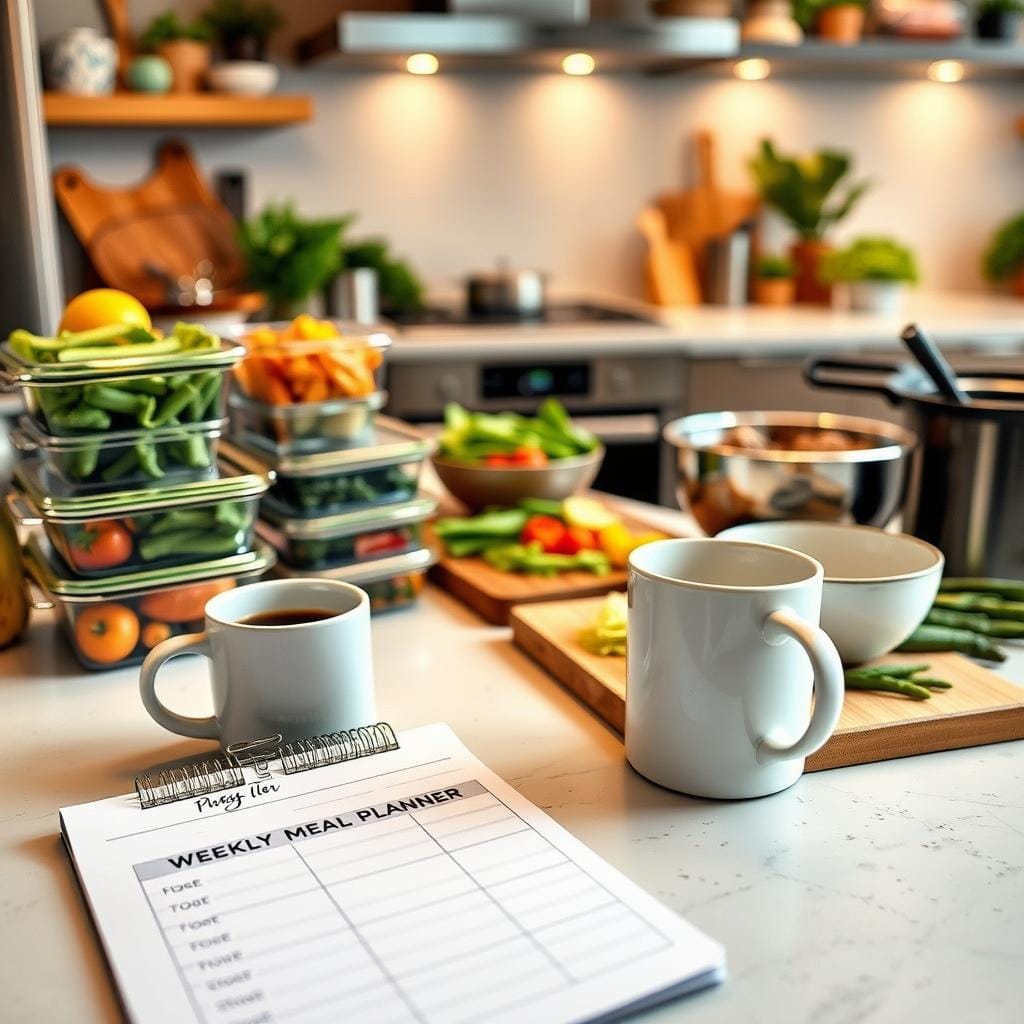
When unexpected events mess up my meal plan, I’ve found ways to stay on track. Meal planning is about being flexible, not rigid.
Quick Meal Ideas for Hectic Days
- 30-minute sheet pan dinners
- Instant Pot recipes
- Slow cooker meals
- Pre-chopped vegetable stir-fries
Having a few quick meal strategies helps a lot during chaotic weeks. These meals need little prep and cook time.
Freezer Meal Options
Freezer meals are my go-to for busy weeks. Spending a few hours on weekends on batch cooking means I always have healthy meals ready.
- Batch-cooked chili
- Frozen lasagna portions
- Pre-marinated protein packages
- Vegetable soup containers
Collaborating with Family Members
Meal prep gets easier when everyone helps out. Assigning tasks to family members not only spreads the work but also makes it more fun.
*”Teamwork makes the meal planning dream work!”*
Using these strategies, I’ve cut down my weekly stress and kept up with healthy eating. Flexible meal plans are about more than food—they’re about living a sustainable lifestyle.
Sticking to My Meal Plan: Staying Motivated
Keeping up with diet planning can be tough. My meal calendar works best when I use smart strategies to stay on track. It’s not just about wanting to do it.
Setting Reminders and Goals
Setting clear, reachable goals makes meal planning easier. I use digital tools and apps to remind me of my weekly meal planning goals. Studies show that 80% of home cooks feel less stressed during meals with a plan.
- Set specific, measurable goals
- Use smartphone apps for tracking
- Create visual progress charts
Joining a Meal Planning Group
Being part of a meal planning group boosts my success. Sharing with others gives me motivation, new recipe ideas, and keeps me accountable. About 43% of people like weekly menus with flexible choices, making groups very helpful.
“Accountability is the secret ingredient to consistent meal planning.” – Nutrition Expert
Rewarding Myself for Success
Positive feedback keeps me going. I reward myself with things that help my health, like new kitchen tools or fitness gear. Celebrating small victories helps me keep up with meal planning.
- New cookbook purchase
- Fitness gear reward
- Self-care treat
Using these methods, I’ve turned meal planning into a fun, lasting part of my life.
Troubleshooting Common Meal Planning Issues
Meal planning can be tough, but with the right strategies, you can beat common problems. I’ve learned that being flexible is key to successful grocery shopping and budget-friendly meals.
Handling Unexpected Schedule Changes
Sometimes, life gets in the way and your meal plan goes awry. When this happens, have a few quick meals ready. Keep meal prep options for kids that can be made fast.
- Keep a list of 3-5 emergency meals
- Stock up on freezer-friendly ingredients
- Be open to swapping meals
Adjusting Meal Plans Based on Appetite
Our hunger levels change, and that’s fine. Listening to your body is key to a good meal plan. Research shows 70% of people save time with meal planning, but it shouldn’t be too strict.
Flexibility is the secret ingredient to sustainable meal planning.
Addressing Food Waste
Food waste is a big issue for many families. Studies say 40% of families cut down on waste with meal planning. My top tips for grocery shopping include:
- Check your pantry before you shop
- Buy only what you need
- Get creative with leftovers
By using these strategies, you’ll save money and reduce waste. Remember, meal planning gets better with practice.
Meal Planning for Events and Special Occasions
Hosting a party or special event can be tough when you’re on a diet. My strategy is to make sure everyone has a great time while keeping food portions and nutrition in check.
Creating a great event menu takes some planning. Knowing what your guests can eat is key. Good meal planning can turn any party into a hit.
Planning Ahead for Parties
Here are some tips for planning a party:
- Guess how many guests will come
- Know what diets they follow
- Make sure the menu has variety
- Have different food options ready
Dietary Considerations for Guests
About 30% of guests have special diet needs. I make sure my menus include something for everyone.
| Dietary Need | Menu Consideration |
|---|---|
| Vegetarian | Plant-based protein options |
| Gluten-Free | Wheat-free alternatives |
| Vegan | Dairy and animal product-free dishes |
Creating a Balanced Buffet Menu
A good buffet needs careful portion control. I mix light and heavy dishes to please all tastes.
The secret to a great event menu is finding the right mix of flavor, nutrition, and what guests like.
By following these diet planning tips, you’ll host a memorable and welcoming meal that everyone will enjoy.
Keeping Track of My Progress
Tracking my diet planning journey is key to my meal planning strategy. Keeping a detailed meal calendar keeps me accountable and motivated. It shows me how my eating habits have changed and where I can improve.
Journaling My Meal Planning Experience
I use digital tools like MyFitnessPal to log my meals and track nutrition. With over 250 million downloads, it has a huge food database. Journaling helps me understand my eating patterns and make better choices about meal planning for different dietary needs.
Reviewing and Adjusting My Goals
Every month, I review my diet planning progress. I compare my goals with my results, seeing what worked and what didn’t. Apps like Cronometer, with over 1.1 million verified food labels, help me make informed decisions.
Analyzing What Works and What Doesn’t
My meal calendar is a powerful tool for understanding nutrition and lifestyle. It’s not just about recording food; it’s about gaining health insights and making improvements. By staying consistent and open to change, I’ve transformed my meal planning and nutrition approach.
FAQ
How much time does meal planning typically take?
Can meal planning help me save money on groceries?
How do I meal plan if I have dietary restrictions?
What if I get bored eating the same meals?
Is meal planning good for weight management?
How far in advance should I plan my meals?
Can I meal plan if I have a busy or unpredictable schedule?
Do I need special equipment to start meal planning?
How can I involve my family in meal planning?
What’s the best way to store meal plan ingredients?
Source Links
- ULTIMATE MEAL PLANNING GUIDE pdf
- Save Time, Eat Healthier, and Stay on Track
- The Ultimate Guide to Meal Planning: Key Benefits & How to Start | Hydrow
- The Ultimate Beginner’s Guide to Meal Planning
- Family Meal Planning Guide: Easy Tips for Busy Parents<br/> — Concierge Medicine of West Michigan | Ada, MI
- A guide to successful meal planning | Xyla Services
- Meal Planning: Strategies for Stress-Free Eating
- Simple Monthly Meal Planning System for Families · a humble place
- Meal planning 101 – Mayo Clinic Press
- How to Make a Meal Plan? Meal Planning 101 | Signos
- Meal Planning Guide: Simplify Your Week with Easy Tips – Supreme Restaurant
- Effective Meal Planning Techniques for the Family
- Healthy meals start with planning
- How to Save Money on Groceries
- 9 Grocery Shopping Tips
- Eat Smart, Spend Less: Guide to a Budget Friendly Healthy Grocery Haul
- How to Meal Prep | The Cook & Him
- How to Master Meal Prep: A Guide to Quick and Easy Weeknight Dinners – Nomadette
- How to Meal Prep (Benefits + Tips)
- Your New Meal Plan: How to Start Eating Well for a Better Life | Decent
- 7 Frameworks to Guide Your Meal Planning Process
- The Ultimate Guide to Batch Cooking | 3 Money-Saving Methods
- Advanced Meal Prepping – Workweek Lunch
- How to Plan Meals for the Week: Expert Tips for Success – Supreme Restaurant
- Meal Planning: The Unsung Hero of a Busy Life
- Meal Prep & Planning for Busy People — GutFit Nutrition
- Simple Meal Planning Tips from a Registered Dietitian
- The Ultimate Guide to Meal Planning for Beginners – Core Recovery
- Meal Planning Simplified
- Practical Steps to Successful Meal Planning: A Dietitian’s Guide – Anne Till Nutrition Group
- Party Planning 101: How to Plan a Party Menu — Chrystina Noel
- A Guide to Menu Planning: Tips and Tricks to Create the Perfect Menu for Your Event — BienVenue Events
- Snap a Picture of Your Meal and This App Will Calculate the Calories
- Eatr・AI Meal Plan・Diet Recipes

